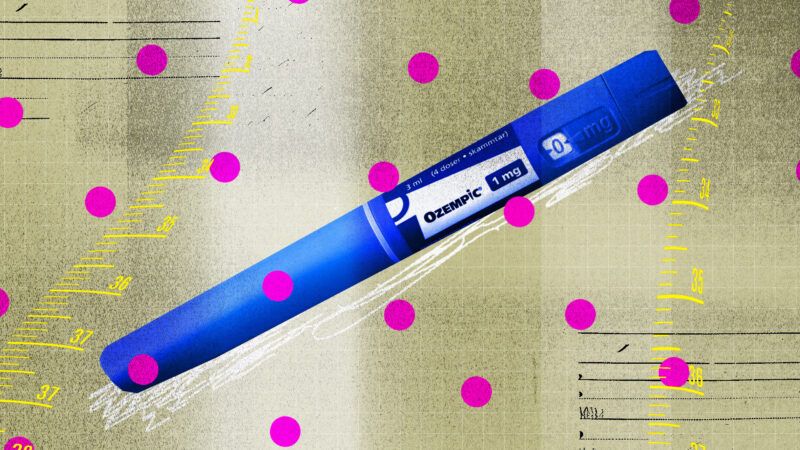It's Time for Over-the-Counter Ozempic
There's an easy way to lower the cost of next-generation weight-loss drugs.

The new insulin-stimulating weight-loss drugs semaglutide and tirzepatide appear impressive. Studies suggest they help people shed pounds, reduce the likelihood of heart attacks and strokes, and may even treat kidney problems, HIV-related liver disease, alcoholism, and other maladies. It is easy to see why semaglutide was the top-selling drug in the United States in 2023 ($38.6 billion in sales), with tirzepatide coming in eighth ($13.2 billion).
Affordability is a problem, though. Novo Nordisk markets semaglutide as Ozempic, Wegovy, and Rybelsus. Eli Lilly markets tirzepatide as Mounjaro and Zepbound. Each company charges about $1,000 per monthly dose. Because over 100 million Americans could benefit from these drugs, three prominent economists estimate that "at current prices, making [them] available to all obese Americans could eventually cost over $1 trillion per year." Sen. Bernie Sanders (I–Vt.) worries that Ozempic "has the potential to bankrupt Medicare, the American people, and our entire health care system."
To make these medicines widely available without breaking the bank, the U.S. Food and Drug Administration (FDA) should do what it already does with some insulin products: Let consumers buy them "over the counter" (OTC). That is, without a prescription.
Drugs tend to be dramatically less expensive when they are available OTC. For example, the per-milligram price of prescription ibuprofen is 28 times higher than that of OTC ibuprofen. The per‐milligram price of prescription naproxen sodium is 3.3–4.2 times higher than for OTC naproxen sodium. The Consumer Healthcare Products Association estimates OTC drugs save consumers $51.6 billion a year relative to higher-priced prescription medicines, plus another $94.8 billion on unnecessary doctor's office visits and diagnostic tests.
Prescription medications tend to be pricier than their OTC equivalents partly because insurance pays for the former while consumers pay for the latter. Consumers are price-sensitive, and their preference for cheaper drugs over more expensive ones stimulates price competition. But when insurers pick up the tab, consumers stop caring and drug makers can overcharge without fear of losing customers.
This is why excessive prices prevail even when patented drugs have close substitutes. In theory, competition should force Novo Nordisk, Eli Lilly, and other companies with similar products to price these drugs reasonably. But when insurers foot the bills, consumers are less willing to switch to cheaper medications and competition fails. Knowing this, drug makers can demand even higher prices than patents alone would allow.
The argument for prescription requirements is that patients will harm themselves if they take medications without physician supervision. Here, the assertion rings hollow. Millions of patients use OTC insulin safely every day.
We—a physician, a law professor, and an economist—believe that patients should be free to purchase the new generation of weight-loss drugs without needing to get permission from government-appointed gatekeepers. But if federal policy makers insist on professional guidance, they should at least allow pharmacists to prescribe these medicines. Many countries, including the United States, use "behind the counter" (BTC) or "OTC-pharmacist" requirements to lessen the burden of government-imposed prescription requirements.
Claims that current prices are necessary to spur innovation should also fall on deaf ears. According to one estimate, a month's supply of semaglutide costs as little as $0.90 to produce. The U.S. government is already encouraging innovation by granting Novo Nordisk and Eli Lilly multiple patents that allow them to charge prices that exceed the cost of production. Moreover, they can charge such prices to an astounding number of potential customers: Worldwide, there are some 2.5 billion overweight adults, plus another 390 million overweight children. The FDA doesn't need to increase prices further by encouraging unnecessary insurance coverage for these drugs.
President Joe Biden says he wants to reduce drug prices. The promise of semaglutide and tirzepatide presents an opportunity to do that. The FDA need only leave consumers free to buy these medicines OTC.


Show Comments (40)